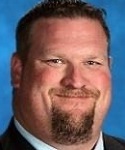
High School a Time for Plays of All Kinds
April 2, 2015
By Jack Roberts
MHSAA executive director
At end of season or school year banquets attended by student-athletes and their parents, I often tell this short story about my mother that never fails to get a good laugh, especially from mothers:
“At the end of my junior year of high school I attended the graduation ceremony for the senior class on a hot and humid early June evening in our stuffy high school gymnasium. The bleachers on each side were filled to capacity, as were several hundred folding chairs placed on the gymnasium floor.
“The public address system, which was wonderful for announcing at basketball games or wrestling meets, was awful for graduation speeches. Person after person spoke, and the huge audience wondered what they had to say.
“I was present because I was the junior class president; and as part of the ceremony, the senior class president handed me a small shovel. It had something to do with accepting responsibility or carrying on tradition.
“In any event, the senior class president spoke briefly; and then it was my turn. I stepped to the podium, pushed the microphone to the side, and spoke in a voice that was heard and understood in every corner of the gymnasium.
“Whereupon my mother, sitting in one of the folding chairs, positioned right in front of my basketball coach – who had benched me for staying out too late on the night before a game, because I had to attend a required school play rehearsal – my mother turned around, pointed her finger at the coach and said, ‘See there? That’s what he learned at play practice!’
“And she was heard in every corner of the gymnasium too.
“But my mother knew – she just knew – that for me, play practice was as important as basketball practice. And she was absolutely correct.”
This old but true story about in-season demands of school sports actually raises two of the key issues of the debate about out-of-season coaching rules.
One is that we are not talking only about sports. School policies should not only protect and promote opportunities for students to participate in more than one sport; they should also allow for opportunities for students to participate in the non-athletic activities that comprehensive, full-service schools provide.
This is because surveys consistently link student achievement in school as well as success in later life with participation in both the athletic and non-athletic activities of schools. Proper policies permit students time to study, time to practice and play sports and time to be engaged in other school activities that provide opportunities to learn and grow as human beings.
A second issue the story presents is that parents have opinions about what is best for their children. In fact, they feel even more entitled to express those opinions today than my mother did almost 50 years ago. In fact, today, parents believe they are uniquely entitled to make the decisions that affect their children. And often they take the attitude that everyone else should butt out of their business!
The MHSAA knows from direct experience that while school administrators want tighter controls on what coaches and students do out of season, and that most student-athletes and coaches will at least tolerate the imposed limits, parents will be highly and emotionally critical of rules that interfere with how they raise their children.
No matter the cost in time or money to join elite teams, take private lessons, travel to far-away practices and further-away tournaments, no matter how unlikely any of this provides the college athletic scholarship return on investment that parents foolishly pursue, those parents believe they have every right to raise their own children their own way and that it’s not the MHSAA’s business to interfere.
It is for this very reason that MHSAA rules have little to say about what students can and can’t do out of season. Instead, the rules advise member schools and their employees what schools themselves have agreed should be the limits. The rules do this to promote competitive balance. They do this in order to avoid never-ending escalating expense of time and money to keep up on the competitive playing field, court, pool, etc.
Every example we have of organized competitive sports is that, in the absence of limits, some people push the boundaries as far as they can for their advantage, which forces other people to go beyond what they believe is right in order to keep up.
If, during the discussions on out-of-season rules, someone suggests that certain policies be eliminated, thinking people will pause to ask what life would be like without those rules.
Our outcome cannot be mere elimination of regulation, which invites chaos; the objective must be shaping a different future.
A good start would be simpler, more understandable and enforceable rules. A bad ending would be if it forces more student-athletes and school coaches to focus on a single sport year-round.

Crowley, Lintner & Smelis Named 2022 Bush Award Recipients
By
Geoff Kimmerly
MHSAA.com senior editor
August 11, 2022
Lowell’s Deanne Crowley, Owosso’s Dallas Lintner and Fenton’s Mitch Smelis all have provided more than two decades of service to Michigan educational athletics, Crowley as a highly-regarded coach and administrator, Lintner also as an administrator and educational leader and Smelis as an athletic trainer and prominent voice in the sports medicine community especially in its service to school sports.
To recognize their significant and continued contributions to educational athletics, Crowley, Lintner and Smelis have been named recipients of the Michigan High School Athletic Association’s Allen W. Bush Award for 2022.
Al Bush served as executive director of the MHSAA for 10 years. The award honors individuals for past and continuing service to school athletics as a coach, administrator, official, trainer, doctor or member of the media. The award was developed to bring recognition to people who are giving and serving without a lot of attention. This is the 31st year of the award, with selections made by the MHSAA's Representative Council.
Crowley began her coaching career at Lake Odessa Lakewood in 1987 with subvarsity basketball, and she took over Lowell’s girls varsity program in 2000 after previously beginning her teaching career there in 1998. She remained the Red Arrows’ coach through 2006, that season leading her team to the Class A Semifinals – and she also was named Class A Coach of Year in 2004 by The Associated Press. Crowley became an assistant principal at Lowell in 2010 and the high school’s athletic director in 2013.
 She earned her certified athletic administrator designation from the National Interscholastic Athletic Administrators Association (NIAAA) in 2018 and was named Region 4 Athletic Director of the Year this past school year by the Michigan Interscholastic Athletic Administrators Association (MIAAA). Previously, she was named Athletic Director of the Year by the Michigan Wrestling Association for the 2018-19 school year and by the West Michigan Officials Association in 2021. Crowley also is a significant contributor to Lowell’s nationally-recognized Pink Arrow Pride program that raises funds annually for cancer awareness, education and support within the Lowell community; she organizes and coordinates the education program, which among other goals provides scholarships for Lowell graduates pursuing careers in medicine. She also was a co-founder in 2000 of the Lady Arrows Varsity Club, which provides leadership training for female student-athletes who have earned a varsity letter.
She earned her certified athletic administrator designation from the National Interscholastic Athletic Administrators Association (NIAAA) in 2018 and was named Region 4 Athletic Director of the Year this past school year by the Michigan Interscholastic Athletic Administrators Association (MIAAA). Previously, she was named Athletic Director of the Year by the Michigan Wrestling Association for the 2018-19 school year and by the West Michigan Officials Association in 2021. Crowley also is a significant contributor to Lowell’s nationally-recognized Pink Arrow Pride program that raises funds annually for cancer awareness, education and support within the Lowell community; she organizes and coordinates the education program, which among other goals provides scholarships for Lowell graduates pursuing careers in medicine. She also was a co-founder in 2000 of the Lady Arrows Varsity Club, which provides leadership training for female student-athletes who have earned a varsity letter.
Crowley graduated from Lakewood High School in 1983 and earned her bachelor’s degree in secondary education from Western Michigan University in 1997 and a master’s in educational administration from Michigan State University in 2002.
“I have known Dee for over 20 years, and she has always been incredibly dedicated to finding opportunities for all students, especially female student-athletes,” Uyl said. “Her years as a coach and administrator have shown a solid record of finding ways for kids to compete.”
Lintner is returning to Owosso High School as principal this fall after finishing the second half of 2021-22 as interim athletic director at Fenton High School. He first joined the staff at Owosso as a teacher in 2001-02, went to Linden as athletic director for two years beginning with fall of 2008, then returned to Owosso as athletic director and assistant principal from 2010 through the 2020-21 school year. He served as principal at Owosso Lincoln High School last school year until leaving for Fenton.
 Education has been a focus of Lintner’s work, and he received a doctorate in educational leadership from University of Michigan-Flint in 2017. He has a certified master athletic administrator designation and has served as a leadership training instructor for the NIAAA since 2015. He also has served as a facilitator for the Love and Logic parenting program.
Education has been a focus of Lintner’s work, and he received a doctorate in educational leadership from University of Michigan-Flint in 2017. He has a certified master athletic administrator designation and has served as a leadership training instructor for the NIAAA since 2015. He also has served as a facilitator for the Love and Logic parenting program.
Lintner has been an active participant with the MIAAA as well, serving as its constitution committee chairperson since 2009. He was a member of the executive board from 2015-20, including serving as president during the 2018-19 school year. As athletic director, he was a frequent host of MHSAA postseason events and a contributor to various committees, and he previously was an MHSAA registered official for track & field and coach in multiple sports. Prior to earning his doctorate, Lintner graduated from Vassar High School in 1995, then earned a bachelor's degree in education from Saginaw Valley State University in 2000 and a master’s in athletic administration from Central Michigan University in 2005.
“Dallas has provided years of solid leadership in Owosso,” MHSAA Executive Director Mark Uyl said. “This consistent approach has led to numerous improvements, and during his tenure as athletic director his school won its first state championship, with the softball program (in 2021).”
Smelis has served as an athletic trainer for 25 years with Fenton Area Public Schools, for the last decade through NovaCare Rehabilitation. He was named High School Athletic Trainer of the Year by the Michigan Athletic Trainers’ Society (MATS) in 2017 and serves as co-chairperson of its Secondary School Committee.
 Also a member of the National Athletic Trainers Association (NATA) and Great Lakes Athletic Trainers Association (GLATA), Smelis has become a key connection between the training community and MHSAA. He has contributed as a MATS liaison on multiple MHSAA sport committees, and serves on the Sports Medicine Advisory Committee and as an instructor for the MHSAA’s Coaches Advancement Program (CAP). He also has presented at the MIAAA’s annual and summer conferences on a variety of physical health and safety and mental health topics.
Also a member of the National Athletic Trainers Association (NATA) and Great Lakes Athletic Trainers Association (GLATA), Smelis has become a key connection between the training community and MHSAA. He has contributed as a MATS liaison on multiple MHSAA sport committees, and serves on the Sports Medicine Advisory Committee and as an instructor for the MHSAA’s Coaches Advancement Program (CAP). He also has presented at the MIAAA’s annual and summer conferences on a variety of physical health and safety and mental health topics.
Smelis graduated from Imlay City High School in 1991 and earned a bachelor’s degree in sports medicine from Central Michigan University in 1997. He is a certified American Heart Association instructor for CPR, first aid and basic life support and has served as lead instructor in CPR and first aid for Fenton’s coaches and staff.
“Mitch has been incredibly dedicated to keeping kids safe while playing all sports,” Uyl said. “He also has been responsible for further strengthening the good relationship between the MHSAA and Michigan Athletic Trainers’ Society, and he continues to provide valuable insight as part of our coaches education efforts.”

